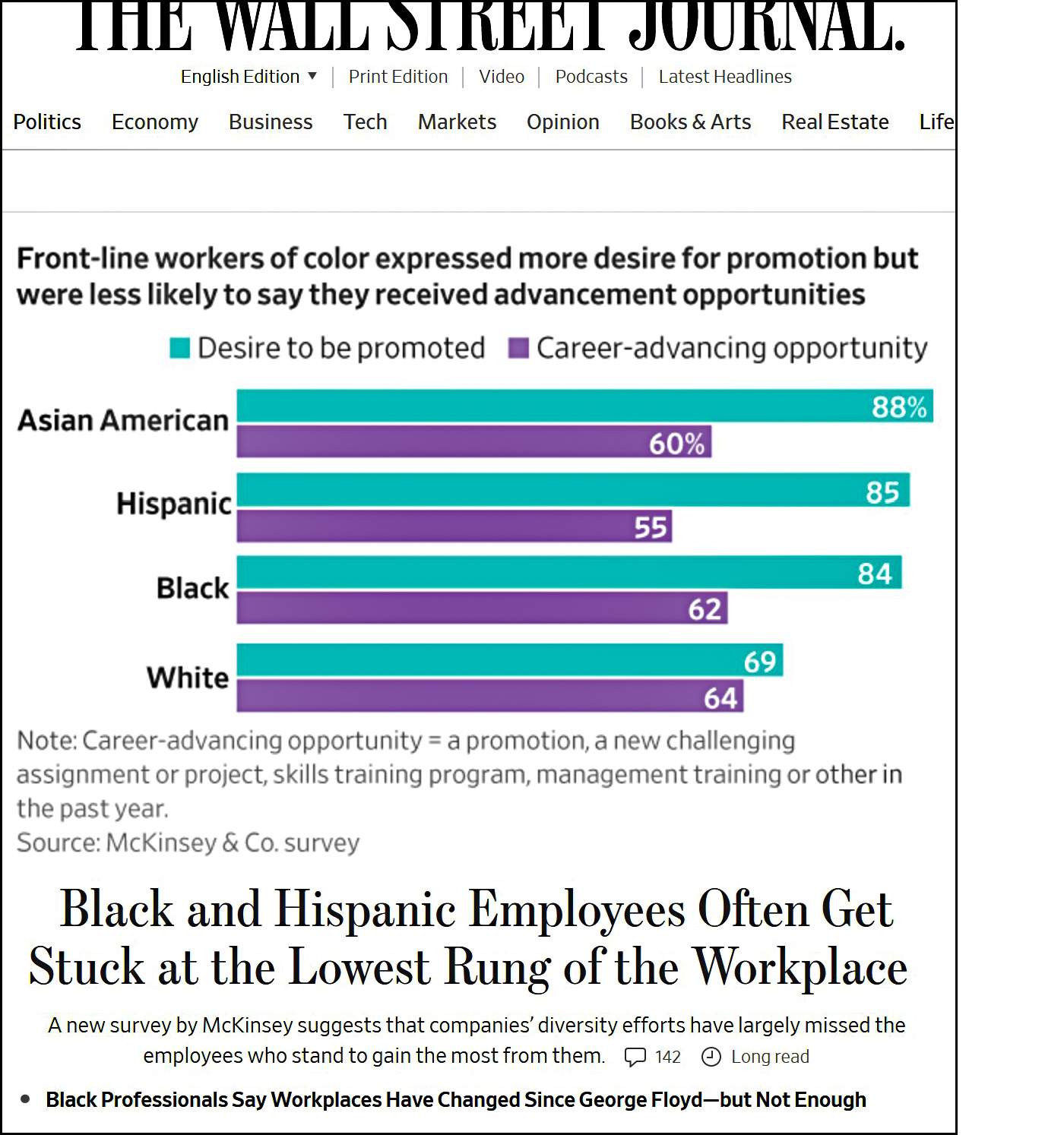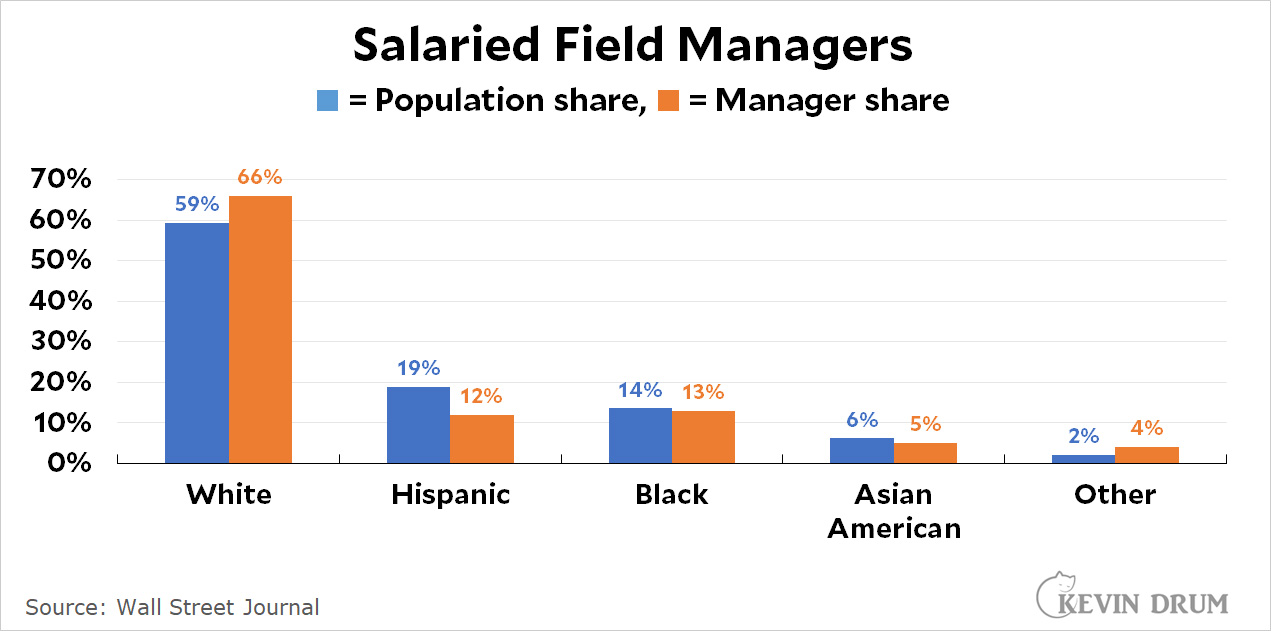The Wall Street Journal had this story splashed across its front page last night:
 Methinks the Journal is trying too hard. It's true that white workers get more career-advancing opportunities than POCs according to this McKinsey report, but the numbers are 55%, 60%, and 62% compared to a white baseline number of 64%. If there's anything surprising here, it's that the POC numbers are within a hair's breadth of the white number. Only Hispanics are lower by any significant amount, and even there it's only nine points.
Methinks the Journal is trying too hard. It's true that white workers get more career-advancing opportunities than POCs according to this McKinsey report, but the numbers are 55%, 60%, and 62% compared to a white baseline number of 64%. If there's anything surprising here, it's that the POC numbers are within a hair's breadth of the white number. Only Hispanics are lower by any significant amount, and even there it's only nine points.
There's also this about front-line workers:
They are less likely than their white peers to find springboards to higher-paying jobs on the front lines, such as assistant store manager or line supervisor. The drop-off is steepest among Black workers,
who make up 17% of hourly jobs at major companies but see their numbers shrink to 9% one step up the ladder in low-level supervisory or management roles.
Apparently the print edition doesn't bother printing the chart for this, but it's in the online edition and I've posted it on the right.
And it's odd. It's true, for example, that Black workers go from 17% of hourly field workers to 9% of hourly field managers. That's a big drop. But then they inexplicably increase to 13% of salaried field managers. That's the best of any POC group—though still considerably worse than white field workers, who are promoted at a higher rate than any other group.
But what's really surprising about this chart is that both Black and Asian American workers are represented at the highest level (salaried field managers) right in line with their numbers in the general population. Only Hispanic workers are represented below their share of the population:
If anything, all this data ought to be presented as surprisingly good news, at least for Black and Asian American front-line workers. Hispanic workers aren't doing as well, but even there they aren't as far behind as I would have guessed—especially given the language issues that might be playing a role here.
The Journal's take is that corporate diversity efforts are floundering at the level of front-line workers. But based just on the statistics they themselves present, I'd say their diversity efforts are paying off pretty well. Am I misreading something here?


JFC Kevin, just call yourself a Republican already. So your take from this is "I thought the on the job racial discrimination would be worse than it seemingly is, so why all the fuzz?"
This is up there with your "if only the left were more tolerant of some racism and racists they'd win some more elections" suggestions.
Lol, Kevin is quite transcedentalist. Your whining does nothing but prove your degenerate hatred of Eurasian people. Socialist reeducation would serve you well.
Kevin Drum, in the most charitable case, is turning into Abe Simpson from the discussion of what's hip.
JFC Solar, Kevin's take on this is exactly what he wrote, not what you imagined. Read the damn words he wrote, instead of trying to impute something he never wrote.
Thank you for your response - it reminds me of someone else's incorrect assumption that I was once rude to KD- ignoring all those who have actually been offensive. And no one gets blocked here by the blogger or a moderator!
Actually he uses statistics to suggest that if there's a problem, it's a problem with Latinos we should focus on. So, exactly the opposite of what you argue.
It's also a numbers game. There are many more field hourly than manager or salary positions.
Any discussion as to why the drop off? Criminal justice reform is still a work in progress and the "War on Drugs"--designed to target the black and brown communities--is still having an effect.
I'm guessing this does show some progress. I'd also guess that the nature of "front line" work has changed a bit too.
Is it reasonable to expect the Journal to point out minority successes?
That things are improving economically for African Americans is obvious simply from the racist back lash. See Tulsa.
Full equality will arrive when the potential for the backlash disappears.
I wonder if the Hispanic mismatch represents a difference in how people are grouped/self-identify and different lags in the classification across data sources?
'Hispanics' often start self-identifying as 'white', while the government in its grand wisdom to distill everyone into simplistic categories, may consider them 'Hispanic' based on some past affiliation (parents considered themselves Hispanic). A hypothesis; really have no idea.
How can you tell if this is good or bad news? Only if you compare with data from earlier days. If the situation improved it is good news, if it worsened it is bad news. Judging from a single point in time is not possible. "It could be worse" is a mile away from either "things are perfect" or "things couldn't be worse".
+1
If we cut to the chase and look at income, most measures show little progress in narrowing the gap:
https://fred.stlouisfed.org/graph/?g=SmXQ
I think Kevin has also show graphs to this effect.
Yes. First, lower-rung salaried positions are just an opportunity to work 50-60+ hours a week and earn less per hour than you made as an hourly worker, with little to no improvement in security. Second, for most people it's the remuneration that matters most, not the title.
Oh Kevin, Kevin, don't you know that *any* racial disparity in outcomes, no matter how small, is prima facie evidence of racism that must be hunted down and annihilated with fire? Even if it's better than it used to be, the fact that it's still not perfect is proof that no real improvement has happened and democracy is a lie? And that you're required to agree with everything the far left believes about race nowadays on pain of being demonized by a Twitter mob?
Go cower in your safe space from the mean people on Twitter, snowflake.
+1